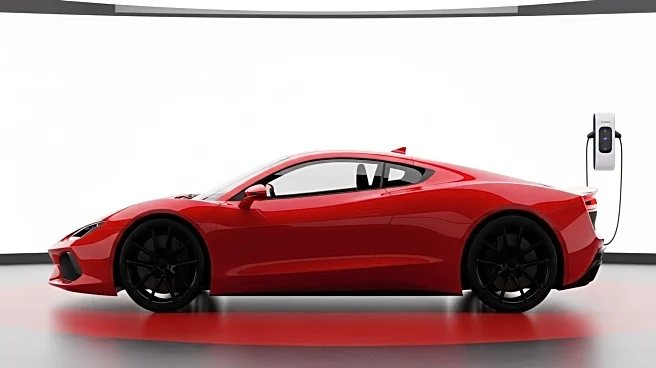What's Happening?
Ferrari's shares experienced a significant drop after the company announced a conservative approach to its electric vehicle (EV) strategy during its Capital Markets Day. The luxury car manufacturer projected revenue of at least 7.1 billion euros ($10.7 billion) by 2025 and approximately 9 billion euros by 2030, with an EBITDA of at least 3.6 billion euros. These figures fell short of analysts' expectations, who anticipated more aggressive growth targets. Additionally, Ferrari revised its 2030 EV share target to 20%, down from a previous 40%, citing customer demand and market conditions. The company's future lineup will be evenly split between combustion and hybrid models. The announcement led to a 16.1% drop in Ferrari's shares in Milan trading, with U.S. shares falling nearly 15% premarket.
Why It's Important?
Ferrari's decision to scale back its EV ambitions reflects broader industry challenges in transitioning to electric vehicles, particularly in the luxury segment where customer preferences may differ from mass-market trends. This conservative approach could impact Ferrari's competitive positioning as other automakers aggressively pursue electrification. The reduced EV target may also influence investor sentiment, as evidenced by the sharp decline in share prices. Analysts have expressed concerns about Ferrari's limited near-term leverage, which could affect its ability to capitalize on emerging market opportunities. However, the introduction of the chassis and powertrain for its first EV, the elettrica, and the anticipated release of a new supercar may provide some support for future profits.
What's Next?
Ferrari plans to launch its first electric vehicle, the elettrica, in 2026, which could be a pivotal moment for the company as it navigates the transition to electrification. The success of this model will likely influence Ferrari's future EV strategy and market positioning. Additionally, the company may need to reassess its approach to meet evolving consumer demands and regulatory pressures for cleaner vehicles. Stakeholders, including investors and industry analysts, will be closely monitoring Ferrari's performance and strategic decisions in the coming years to evaluate its ability to adapt to the changing automotive landscape.
Beyond the Headlines
Ferrari's cautious EV strategy highlights the complexities luxury automakers face in balancing tradition with innovation. The company's decision to maintain a significant portion of its lineup as combustion and hybrid models underscores the ongoing demand for traditional high-performance vehicles. This approach may also reflect Ferrari's commitment to preserving its brand identity and heritage, which is deeply rooted in combustion engine technology. As the automotive industry continues to evolve, Ferrari's strategy will likely influence broader discussions on the future of luxury vehicles and the role of electrification in this segment.










